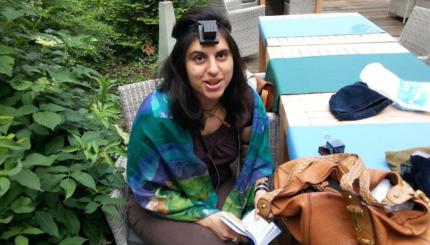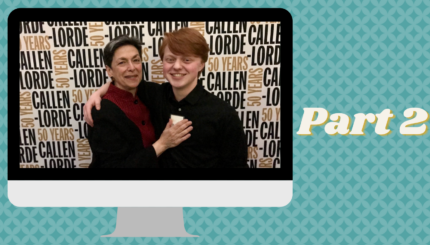Preferred Gender Pronouns: a phrase that confuses people who haven’t heard it before. To many, pronouns seem fixed. How could somebody “prefer” pronouns?
Much like gender, pronouns can be fluid and varied. Just as someone might transition from man to woman or vice versa, their pronouns might similarly shift from he/him/his to she/her/hers. After all, it wouldn’t make sense to refer to someone who’s outwardly become the woman she’s known herself to be by masculine pronouns.
But what pronouns can be used by people who realize that they identify in a way that’s not strictly masculine or feminine, neither a woman nor a man—perhaps occupying both of those spaces, sitting somewhere on that spectrum of gender, or entirely outside of it?
It makes sense, then, that new pronouns and new uses for familiar pronouns have developed to talk about someone who is neither a woman nor a man. A couple examples are “they/them/their” used as a singular pronoun instead of plural, and “ze/hir/hirs,” a set which many have not encountered until a person in their life brings them to their attention.
***
I identify as genderqueer, and for me that means that I don’t consider myself a man or a woman, despite the sex I may have been assigned at birth and the gender into which I’ve been socialized. Though my gender expression may move along the spectrum between masculinity and femininity, at the end of the day, the way I conceive of myself is outside of that framework. “Genderqueer,” at this point, is the term that feels most comfortable to me, but other people with similar self-conceptions may identify as “agender,” “nonbinary,” or whatever most speaks to them.
For a while, it was enough that I knew I was genderqueer—and that I could share that within certain close relationships. After some time though, I started to realize that when “he/him/his” pronouns were used about me, they didn’t sit right. If I really wasn’t a man, then why would I want to be referred to as such? Why would I want other people to infer that whoever I am, I am a he when that wasn’t how I understood myself?
I became drawn to “they/them/their” perhaps because they are familiar pronouns I’d already used in a singular sense. For as long as I can remember, if I didn’t know a person’s gender, or if I was speaking about someone and I didn’t want to disclose gendered information about them, or even if I was talking about a proverbial person, I used “they.” It felt natural to say it, and it didn’t confuse people (except for Microsoft Word’s syntax check, and the occasional more traditional English teacher).
With some prompting from a friend who created a safe space to experiment, I began to use “they/them/their” pronouns. I was amazed at the immediate impact I felt. I was nervous to start using them, but also excited. Finally, the way people talked about me aligned with the way I felt about myself. No longer did I get put in a gendered box that didn’t fit. I’d moved out and moved beyond.
Even now, nearly a year later, I get little thrills when someone uses the correct pronouns. The understanding they have of me, the effort they’re making, is linguistic proof that they consider me in how they construct their thoughts. It warms my heart.
People slip up, but it’s not hard to tell when they’re trying. And that matters a lot.
It can be difficult to change the way one speaks. If you’re used to calling a cousin you’ve known your whole life “he,” it can be a cognitive leap to start using “she” or “ze” instead. Habits die hard. There is a difference, however, between slipping into an old habit and complacency. Yes, it can be work to use pronouns that you didn’t previously associate with someone or to use pronouns you’ve never used in such a way before. But it’s work that should be done, because it’s work that matters.
Using preferred gender pronouns is a matter of kavod (respect) and of sh’mirat halashon (guarding one’s use of language), two Jewish values that can inspire us. If you want to treat someone with respect, listen to what they’re asking of you and give it to them. It takes nothing away from you and it gives so much to that person whose preferred pronouns you’re using. As for guarding one’s use of language, anything spoken negatively about another person has a costly effect. You may say something that you did not even mean but could have disastrous effects. Every word we speak has an impact.
* * *
How do I describe what it’s like to be misgendered? It’s a reminder of all the things that I’m trying not to be. Having never felt comfortable in masculine spaces, being placed back there with a simple two- or three-letter word is a harsh reminder of things I can’t change and efforts gone unnoticed, all because of ingrained filters of gender that are too large for me to dismantle singlehandedly. It can send me tail-spinning into a storm of negativity.
A friend recently sent me a link to an article on Bustle about what the writer learned from switching to gender-neutral pronouns. What the author wrote about their genderqueer identity felt so similar to my experiences, and when I read what they said about their misgendering experiences, it felt like someone had taken the thoughts straight out of my head: “It makes me feel less authentic, less me, and if I’m having a bad day, it can make me feel dissociative.”
“Dissociative” is such a powerful way to describe the sensation of being misgendered. Perhaps the writer is alluding to a serious and diagnosed psychological disorder. Even if they’re not, it’s still apt. Reflecting how I am detached from my appropriate pronoun, I find myself detached from my identity, which is nothing short of traumatic. That forced dissociation from myself crushes me, especially because it comes after having taken the risk to share myself in truth with another person.
I have extended the invitation to meet me and see me as I truly am. Why not take that?
Like this post?


